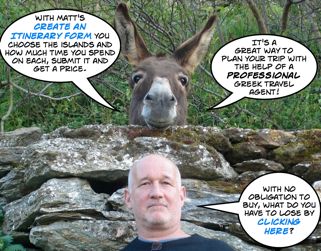
What's New At The Attica Zoo
|
|
|||
What's New At The Attica Zoo |
|||
|
|
|
|
|
|
|
|
We believe that
today, and even more in the future, we can offer a
small contribution to all the above. |
|
Visit their website for information on hours and tickets and events |
|
Return to Athens Zoo front Page |
Meet some of the birds and animals... |
Help Support Matt's Greece Guides
Do you enjoy using my site? Have you found it entertaining as well as useful? If so please show your appreciation by booking hotels through the travel agencies and the links found on my Hotels of Greece site. The small commission I make on the bookings enable me to keep working and in most cases you won't find them any cheaper by searching elsewhere.
You can find
hotels in Greece by location, price, whether or not it has a swimming pool, and see photos and reviews by using this link to booking.com which also contributes to my website when you book. If you are appreciative of all the free information you get on my websites you can also send
a donation through Paypal or Venmo
Join Matt Barrett's Greece Travel Guides Group on Facebook for comments, photos and other fun stuff. If you enjoy this website please share it with your friends on Facebook and other social media.




 At the end of June 2003, another extension was added to our Park, where
the visitors have the opportunity to observe the closest relative to man,
the Monkeys and Apes . In December 2004 the
session of the wild cats was extended with Tigers, Servals and
Ocelots , a big area was added to the African Savannah and a part of the New
extension was opened with Pygmy
Hippos and Prairie dogs. The new extension will be completed mid 2005 with African wild dogs, Alligators , trained
Seals and theforest of the Monkeys. Our Park offers recreational as well as
educational experiences. We believe that creating awareness is very important
for the protection of wild life and the environment in general and accordingly
we offer educational programs as well as guided tours for school
children.
At the end of June 2003, another extension was added to our Park, where
the visitors have the opportunity to observe the closest relative to man,
the Monkeys and Apes . In December 2004 the
session of the wild cats was extended with Tigers, Servals and
Ocelots , a big area was added to the African Savannah and a part of the New
extension was opened with Pygmy
Hippos and Prairie dogs. The new extension will be completed mid 2005 with African wild dogs, Alligators , trained
Seals and theforest of the Monkeys. Our Park offers recreational as well as
educational experiences. We believe that creating awareness is very important
for the protection of wild life and the environment in general and accordingly
we offer educational programs as well as guided tours for school
children.
 Our Park is a recognized member of EAZA (European Association of Zoos and Aquaria) and as
such we apply all standards required by the Association (animal husbandry,
animal welfare, education of visitors, etc) Within the EAZA framework we
participate in 9 European Endangered Species Programs (EEP's) and 18 European
Studbook Programs (ESB's) with a view to develop captive breeding of threatened
species. Since early 2004 all our animals are registered and followed
through ISIS (International Species Information System) and
ARKS (Animal Record Keeping System) and as such we have also access to an
international inter-zoo database for all the species we keep and as well as
others we eventually intend to keep.
Our Park is a recognized member of EAZA (European Association of Zoos and Aquaria) and as
such we apply all standards required by the Association (animal husbandry,
animal welfare, education of visitors, etc) Within the EAZA framework we
participate in 9 European Endangered Species Programs (EEP's) and 18 European
Studbook Programs (ESB's) with a view to develop captive breeding of threatened
species. Since early 2004 all our animals are registered and followed
through ISIS (International Species Information System) and
ARKS (Animal Record Keeping System) and as such we have also access to an
international inter-zoo database for all the species we keep and as well as
others we eventually intend to keep. For visitors, Zoos are a place for entertainment and relaxation.
For us it is also a place of education and species
conservation.
For visitors, Zoos are a place for entertainment and relaxation.
For us it is also a place of education and species
conservation.


